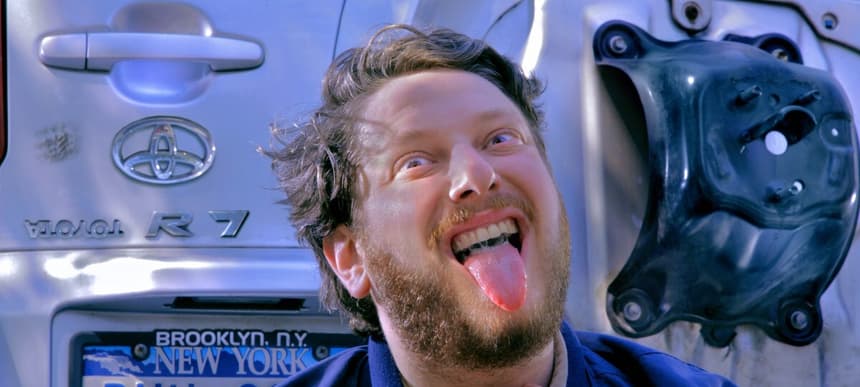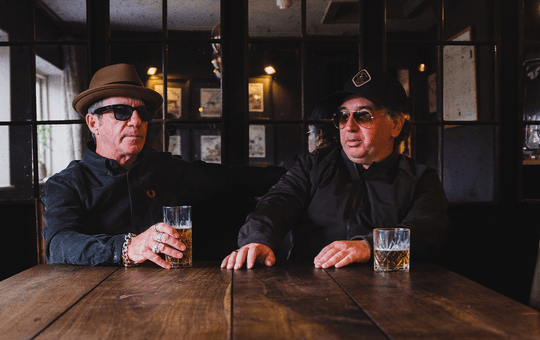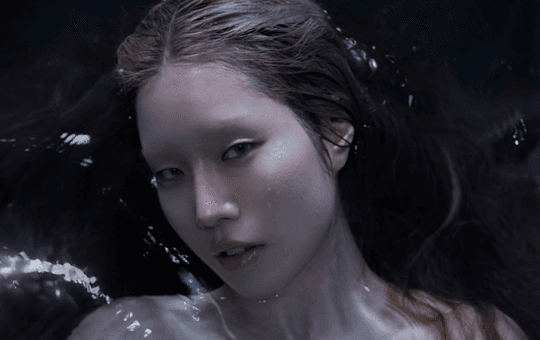
Oneohtrix Point Never: "So eerie and seductive."
After finishing a tour opening for Nine Inch Nails and Soundgarden last year, Daniel Lopatin locked himself in a windowless basement studio in New York to record ‘Garden of Delete’, his latest album as Oneohtrix Point Never. He’d listened to those bands as a teenager, and whether consciously or not, he found his music had opened itself up to this heavier, noisier energy again. “I absorbed that whole tour and got back home and started working on music when I was still in that mind frame,” Lopatin explains, sitting on a rooftop balcony outside his label Warp Records’ London office, a cup of coffee in one hand and a cigarette in the other.
‘Garden of Delete’ might be Lopatin’s loudest album to date, but it’s still a Oneohtrix Point Never album. Over the past decade, the experimental musician has explored a multitude of idiosyncratic ideas across his albums, and it feels like ‘Garden of Delete’ brings a lot of these ideas together: the eccojams of his Chuck Person days, the ambient dronescapes of ‘Returnal’, the sound collages of ‘Replica’, and the micro-scale editing techniques of ‘R Plus Seven’. But there’s plenty of new ground that he explores, too, particularly in the use of vocals, which are rendered using the Chipspeak software instrument rather than sung by a human being. As ever, Lopatin uses the detritus of low culture as raw materials from which to carve out his sound designs: you can hear shades of alt-rock, cybermetal, techno, trance, and Top 40 radio throughout the record.
Lopatin announced ‘Garden of Delete’ with a strange promotional campaign that told stories of an alien named Ezra through old blogspots, puzzling PDF documents, and data-dumped MIDI files. It’s a piece of world building that doesn’t necessarily relate to the album on a direct level – ‘Garden of Delete’ isn’t a concept album – but it still fits its tone perfectly. “That stuff is fun,” Lopatin says, “I feel relieved that I was able to get [the promo campaign] closer to my world and make it more like a creative activity I might’ve done in sixth grade, coming up with characters and stuff. I used to make cassette covers of bands that didn’t exist. I don’t see how that’s any different to what I’m doing now.”
Where did the album’s aggressive energy come from?
Oneohtrix Point Never: “A lot of it was circumstantial. I’d been on tour with Nine Inch Nails and Soundgarden, and we had satellite radio in the car. We had a rule where we were like ‘Okay, we’re only gonna listen to Lithium and Ozzy’s Boneyard.’ So we let that whole weird TapouT vibe kind of seep in instead of fighting it. I was playing before Soundgarden, so their fans were just trickling in when I was playing. They were fairly disturbed by my drone set. However, Kim Thayil, the amazing guitarist from Soundgarden, totally dug it – which makes sense, because he’s a fan of The Melvins.”
So it was a musical thing rather than anything to do with the circumstances in your own life?
Oneohtrix Point Never: “I was also thinking about the years of my life when I was listening to that stuff seriously. I was thinking about puberty a lot. I was born in ’82, so when I was listening to [Soundgarden’s] ‘Superunknown’, it pretty much perfectly lined up with my acne breakout, hair growing on my face – all of that shit. [The album]’s a bit of a memoir, in a way. I used whatever memories I have left of puberty – which isn’t a lot – and what I realised is that most of the memories I do have from that time in my life are pretty traumatic. So it lended itself to that aggressive sound.”
How did you approach the album differently to ‘R Plus Seven’?
Oneohtrix Point Never: “They have common ground…”
Yeah, I actually felt like it consolidates a lot of different ideas from across your albums over the years.
Oneohtrix Point Never: “I agree. I actually think it has a lot to do with the early stuff. It’s funny because journalists keep saying ‘Oh, this is a wild new sound from you.’ [But] I was making pretty aggressive, nihilistic stuff early on and kind of went away from that for a bit. In some ways I feel like I’m back now – but I’m a better producer. It’d be cool to talk to the Oneohtrix Point Never of 2005 and show him this record. I bet it would make more sense to him than it would the ‘Replica’ kid.
“‘R Plus Seven’ I made at home, and I made it at the onset of a new relationship. She had moved into my apartment. I’d lived in this apartment myself, and now she’d moved in, and it was such a more pleasant place [laughs]. So the album has this domesticity to it. It’s an album of little interior tableaus. With this one, I was like, ‘Alright, gotta get a studio.’ It didn’t have windows, so you just lose track of time. You’re on your own for 16 hours without any girlfriend intervention, so you’re definitely gonna turn the clock back to teenage behaviour. So a lot of it was environmental.”
"[The album]’s a bit of a memoir. I used whatever memories I have left of puberty, and what I realised is that most of the memories I do have from that time in my life are pretty traumatic. So it lended itself to that aggressive sound." – Oneohtrix Point Never
How does it affect your ability to make music, having someone invade your, I suppose, ‘mancave’?
Oneohtrix Point Never: “I suppose I wanted to impress her and make something that she thought was beautiful. I remember I was working on it when we were starting to date and I was like, ‘I gotta make it more like the way you dress,’ which is really classy, really stylish. Luckily she likes this album, because it has more to do with the way that I dress. In general it’s a good idea to let your environment seep in and to accept it.”
‘Garden of Delete’ has been talked about as your ‘rock record’, but I feel like I can also hear a really garbled, processed version of Top 40 chart music in it as well.
Oneohtrix Point Never: “I got really addicted to Vevo because we have it on our Apple TV at home. I watch it every morning when I eat breakfast. You pick up interesting techniques from [chart music] – sometimes on curiosity or novelty, but a lot of the time it inspires new techniques or has me thinking ‘How did that producer pull that weird transition off?’ I don’t like to ignore it. I think it’s a staging area for a lot of good ideas.”
Can you talk about your vocal processing on the album? It’s pretty bananas.
Oneohtrix Point Never: “There’s this company called Plogue that make this software instrument called Chipspeech. It’s a speech synthesizer, essentially. You can write in text and play it chromatically. That was a starting point for me to write vocals and actually have real vocal melodies. I wanted it to have all the quirks of a real voice – weird melasmatic turns, guttural stuff, mistakes, syblet sounds – just crap that happens when you’re talking or getting upset or excited. [I was] using other pieces of software to offset the kind of robotic ubiquity of that piece of software and to make it more human. I thought it was a productive solution to the problem of getting vocal melodies on the record.”
You’ve built this whole world with the album, this quasi-ARG. While I’m not necessarily so interested in talking about the specifics of its story, I want to know where your interest in world-building might’ve come from?
Oneohtrix Point Never: “The interesting thing about [exploring a fictional world] is that you can revisit the same place a bunch of times and have it feel different every time. You discover new things in a place you’ve never been before. I liked that feeling. I liked playing Xeno games as a kid. I liked to wander off. The repetition of these places is so eerie and seductive to me. It just makes me feel something that’s ineffable that I can’t really describe – it’s like a place I really wanna be a lot of the time. I was never particularly good at RPGs. I was the youngest in a crew of kids in elementary school that were playing Rifts. They didn’t really let me play because I was too young to do it well, so I was always sitting on the outside watching them play. I was getting the feeling of it. I loved it, and I loved the language and all of the creativity. I always loved watching people play video games. In fact, I’m gonna go watch Dom [Flanagan] from LuckyMe play the new Metal Gear tonight. There’s just something seductive about those spaces.”
As a kid playing video games I always wanted to explore beyond the environment that was in front of you – because as a kid you have so much time on your hands, you can explore literally every part of a game.
Oneohtrix Point Never: “Every nook and cranny. I remember getting like that with Metroid, getting so excited that I was figuring it out, [going to] places where you can’t really do anything, or places where you get stuck – these kind of impasses that fuck you up. It’s like… I dunno, it’s the best. It gives you chills.”
Was world-building something you’d wanted to do before, but not had the audience or the resources?
Oneohtrix Point Never: “One of the things I realised promoting ‘R Plus Seven’ was that I didn’t ever really do promotion. That was my first record for Warp, so I was like ‘Oh, I guess I’ve gotta do promotion.’ It was an experiment. Now, the second time around, I’m like ‘Cool, I want you guys to do what you need to do and I’m gonna do what I need to do,’ which was to communicate more with my fans. I never really knew I had fans – even though I did, but it didn’t really feel like I did. It always felt like I was just kind of doing stuff on my own and people would like it. But I’ve been doing this for a while and I think I have fans that really understand it.”
"You pick up interesting techniques from [chart music] – sometimes on curiosity or novelty, but a lot of the time it inspires new techniques or has me thinking ‘How did that producer pull that weird transition off?’ I don’t like to ignore it. I think it’s a staging area for a lot of good ideas." – Oneohtrix Point Never
Back to ‘Garden of Delete’ – is it a concept album?
Oneohtrix Point Never: “Nah, it’s more programmatic, less like a concept album. It’s open to outside influences, but they’re vague. A concept album is like ‘The Wall’. There’s a real corniness to how severe the points to that album are made – and how they’re made is so blatant! Those are the tenets of a true concept record – corniness, and a brazen belief in some kind of message you’re giving people. I don’t necessarily think that I have that. It’s just loosely having fun with concepts.”
I love with concept albums that you get completely locked to them. You can’t deviate from the concept. I almost admire big rock acts that did stuff like that, because you’re limiting yourself so much.
Oneohtrix Point Never: “It’s cool! You’re possessing all of this power over the album, even more so than what’s already built in. You’re already making a record and shoving it in people’s faces, and then on top of that you’re going ‘This is how you should think about it.’ I didn’t really intend for all of this stuff to influence the listening perhaps as much as it will, but I don’t feel like it’s a big deal because all of the peripheral activity around the record is pretty loose. I don’t think it ends up imprisoning you into some kind of idea about what the record means.”
See, I’ve read interviews with you before where you talk about the way you conceptualise your music, and you often seem to have quite big ideas. But I never know how much of it influences the music you’re making and how much of it comes after the fact.
Oneohtrix Point Never: “I totally know what you’re saying. I wanted to make a hyperactive/depressive record, and I knew I wanted it to be more on the aggressive side of things, but all of the other peripheral stuff happened after the record was delivered and I wanted to entertain myself. But the heavier ideas are, to me, very clear. I got super into Julia Kristeva, who’s a philosopher, and she has this theory of abjection. It’s generally about our fascination with our bodies and the grotesque, and things that we perceive as meant to be inside [our bodies] and under wraps, and how when they come out, we can’t help but looking at. I got obsessed with that stuff – I thought it was an amazing way of thinking about the record. So there is some stuff that’s happening while I’m making it, but generally speaking, I was just trying to write some songs.”
Warp Records release 'Garden of Delete' on November 13th 2015 (buy). Oneohtrix Point New plays a live A/V set at Illuminations on November 8th (tickets).













